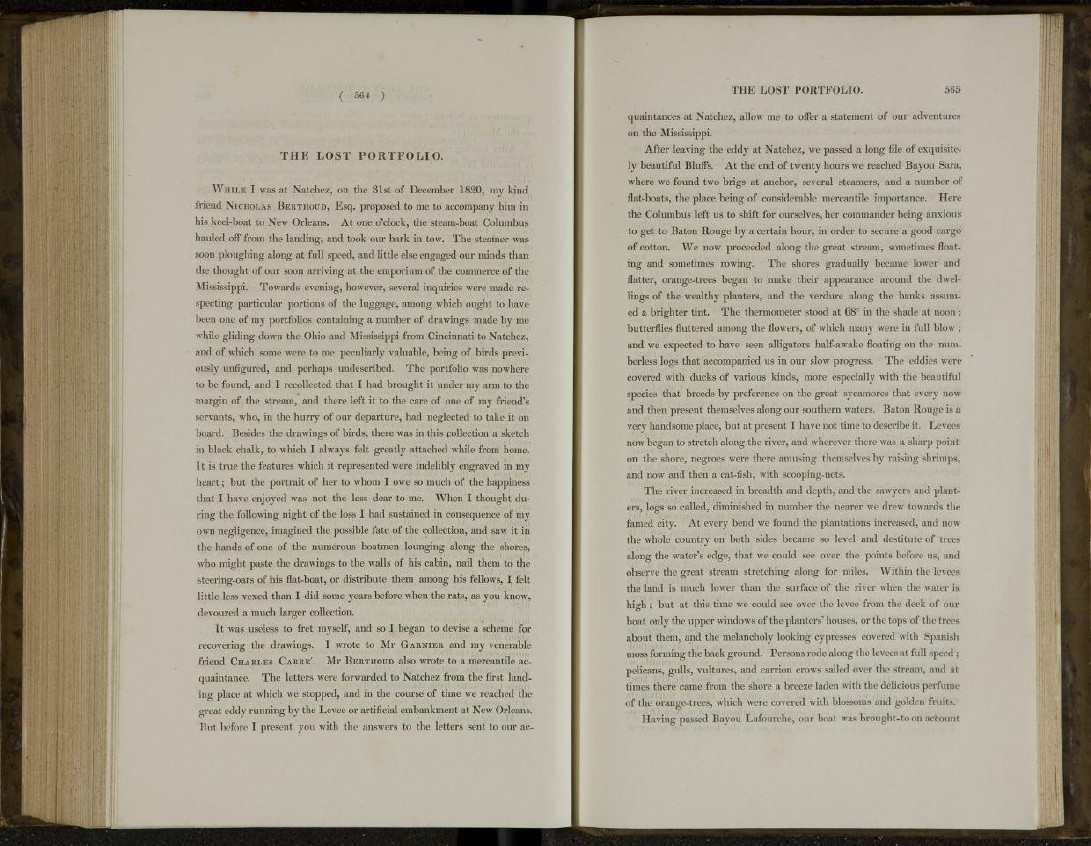
THE LOST PORTFOLIO.
WHILE I was at Natchez, on the 31st of December 1820, my kind
friend NICHOLAS BERTHOUD, Esq. proposed to me to accompany him in
his keel-boat to New Orleans. At one o'clock, the steam-boat Columbus
hauled off from the landing, and took our bark in tow. The steamer was
soon ploughing along at full speed, and little else engaged our minds than
the thought of our soon arriving at the emporium of the commerce of the
Mississippi. Towards evening, however, several inquiries were made respecting
particular portions of the luggage, among which ought to have
been one of my portfolios containing a number of drawings made by me
while gliding down the Ohio and Mississippi from Cincinnati to Natchez,
and of which some were to me peculiarly valuable, being of birds previously
unfigured, and perhaps undescribed. The portfolio was nowhere
to be found, and I recollected that I had brought it under my arm to the
margin of the stream, and there left it to the care of one of my friend's
servants, who, in the hurry of our departure, had neglected to take it on
board. Besides the drawings of birds, there was in this collection a sketch
in black chalk, to which I always felt greatly attached while from home.
It is true the features which it represented were indelibly engraved in my
heart; but the portrait of her to whom I owe so much of the happiness
that I have enjoyed was not the less dear to me. When I thought during
the following night of the loss I had sustained in consequence of my
own negligence, imagined the possible fate of the collection, and saw it in
the hands of one of the numerous boatmen lounging along the shores,
who might paste the drawings to the walls of his cabin, nail them to the
steering-oars of his flat-boat, or distribute them among his fellows, I felt
little less vexed than I did some years before when the rats, as you know,
devoured a much larger collection.
It was useless to fret myself, and so I began to devise a scheme for
recovering the drawings. I wrote to Mr GARNIER and my venerable
friend CHARLES CARRE'. Mr BERTHOUD also wrote to a mercantile acquaintance.
The letters were forwarded to Natchez from the first landing
place at which we stopped, and in the course of time we reached the
great eddy running by the Levee or artificial embankment at New Orleans.
But before I present you with the answers to the letters sent to our acquaintances
at Natchez, allow me to offer a statement of our adventures
on the Mississippi.
After leaving the eddy at Natchez, we passed a long file of exquisitely
beautiful Bluffs. At the end of twenty hours we reached Bayou Sara,
where we found two brigs at anchor, several steamers, and a number of
flat-boats, the place being of considerable mercantile importance. Here
the Columbus left us to shift for ourselves, her commander being anxious
to get to Baton Rouge by a certain hour, in order to secure a good cargo
of cotton. We now proceeded along the great stream, sometimes floating
and sometimes rowing. The shores gradually became lower and
flatter, orange-trees began to make their appearance around the dwellings
of the wealthy planters, and the verdure along the banks assumed
a brighter tint. The thermometer stood at 68° in the shade at noon;
butterflies fluttered among the flowers, of which many were in full blow ;
and we expected to have seen alligators half-awake floating on the numberless
logs that accompanied us in our slow progress. The eddies were
covered with ducks of various kinds, more especially with the beautiful
species that breeds by preference on the great sycamores that every now
and then present themselves along our southern waters. Baton Rouge is a
very handsome place, but at present I have not time to describe it. Levees
now began to stretch along the river, and wherever there was a sharp point
on the shore, negroes were there amusing themselves by raising shrimps,
and now and then a cat-fish, with scooping-nets.
The river increased in breadth and depth, and the sawyers and planters,
logs so called, diminished in number the nearer we drew towards the
famed city. At every bend we found the plantations increased, and now
the whole country on both sides became so level and destitute of trees
along the water's edge, that we could see over the points before us, and
observe the great stream stretching along for miles. Within the levees
the land is much lower than the surface of the river when the water is
high ; but at this time we could see over the levee from the deck of our
boat only the upper windows of the planters' houses, or the tops of the trees
about them, and the melancholy looking cypresses covered with Spanish
moss forming the back ground. Persons rode along the levees at full speed;
pelicans, gulls, vultures, and carrion crows sailed over the stream, and at
times there came from the shore a breeze laden with the delicious perfume
of the orange-trees, which were covered with blossoms and golden fruits.
Having passed Bayou Lafourche, our boat was brought-toon account